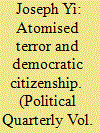| Srl | Item |
| 1 |
ID:
123776


|
|
|
|
|
| Publication |
2013.
|
| Summary/Abstract |
This essay connects the 2103 Boston Bombings to the dynamics of a highly individualist, modern society. The perpetrators (Tsarnaev brothers) represent an atomized stratum of Americans, disconnected from communal institutions and organizations; socially insignificant men, ready to commit publicized, albeit isolated, acts of violence. With the exception of the World Trade Center, major terrorist attacks in the past two decades have been perpetrated by asocial, isolated individuals. An expansive security and welfare state is an inadequate response to atomized terror and is potentially problematic for our liberties. An approach more consistent with security and freedom is to nurture the rights and responsibilities of democratic citizenship.
|
|
|
|
|
|
|
|
|
|
|
|
|
|
|
|
| 2 |
ID:
099570


|
|
|
|
|
| Publication |
2010.
|
| Summary/Abstract |
This essay discusses the jury's value in American democracy by examining Alexis de Tocqueville's analysis of the jury as a free school for the public. His account of jury socialization, which stressed lay deference to judges and trust in professional knowledge, was one side of a complex set of ideas about trust and authority in American political thought. Tocqueville's contemporary Francis Lieber held juries to have important competencies and to be ambivalent rather than deferential regarding court professionals. The nineteenth-century courtroom exhibited such ambivalence and was marked by institutional conflict involving increasing professional authority demanded by the bench and populist counter-pressures. Assessing the value of the jury today may require some of the conceptual tools Tocqueville offers, but must also renew an appreciation of the jury as a site that utilizes already existing juridical capabilities of lay people and thus re-conceive the relationship between lay people and court professionals.
|
|
|
|
|
|
|
|
|
|
|
|
|
|
|
|